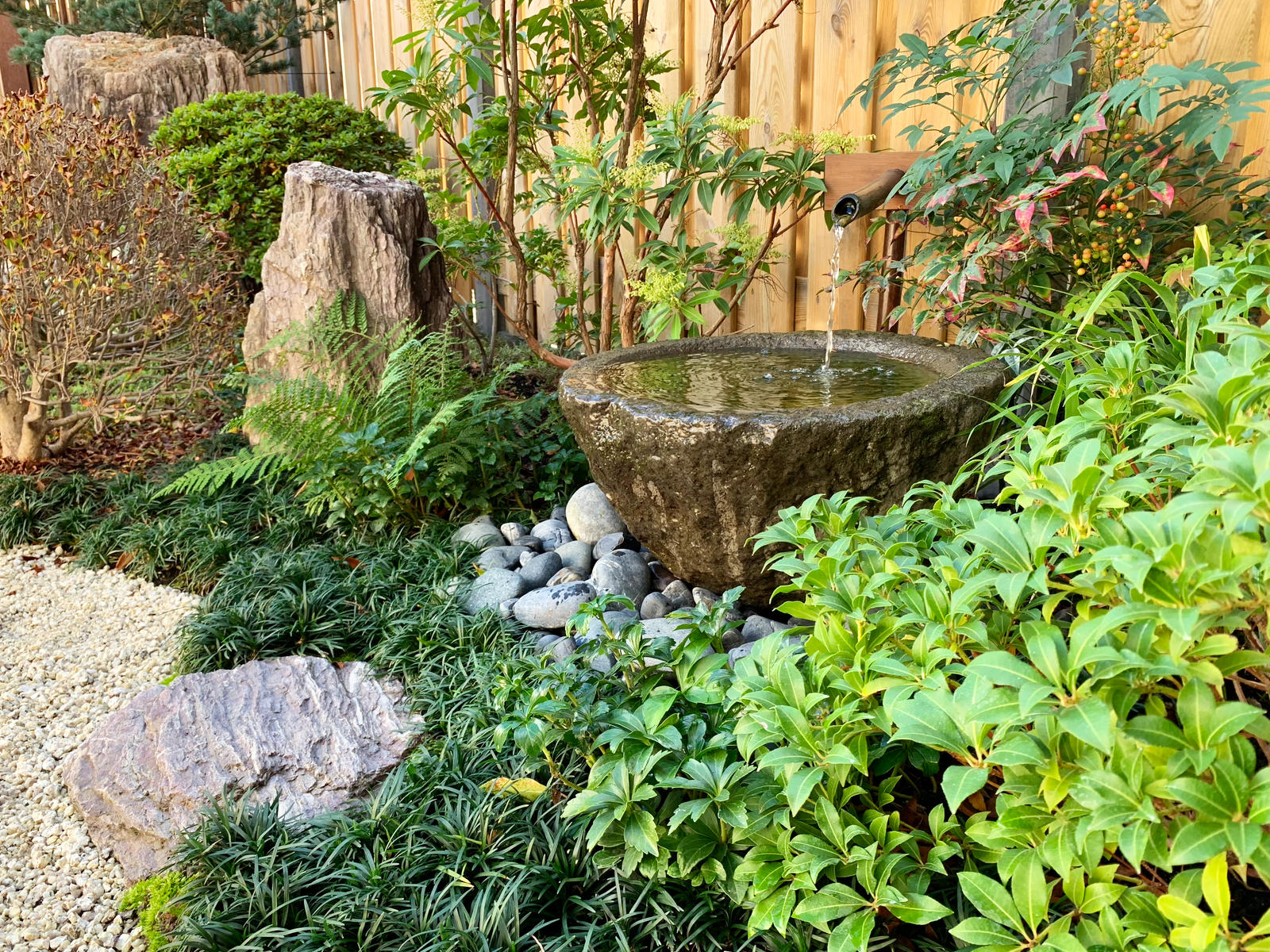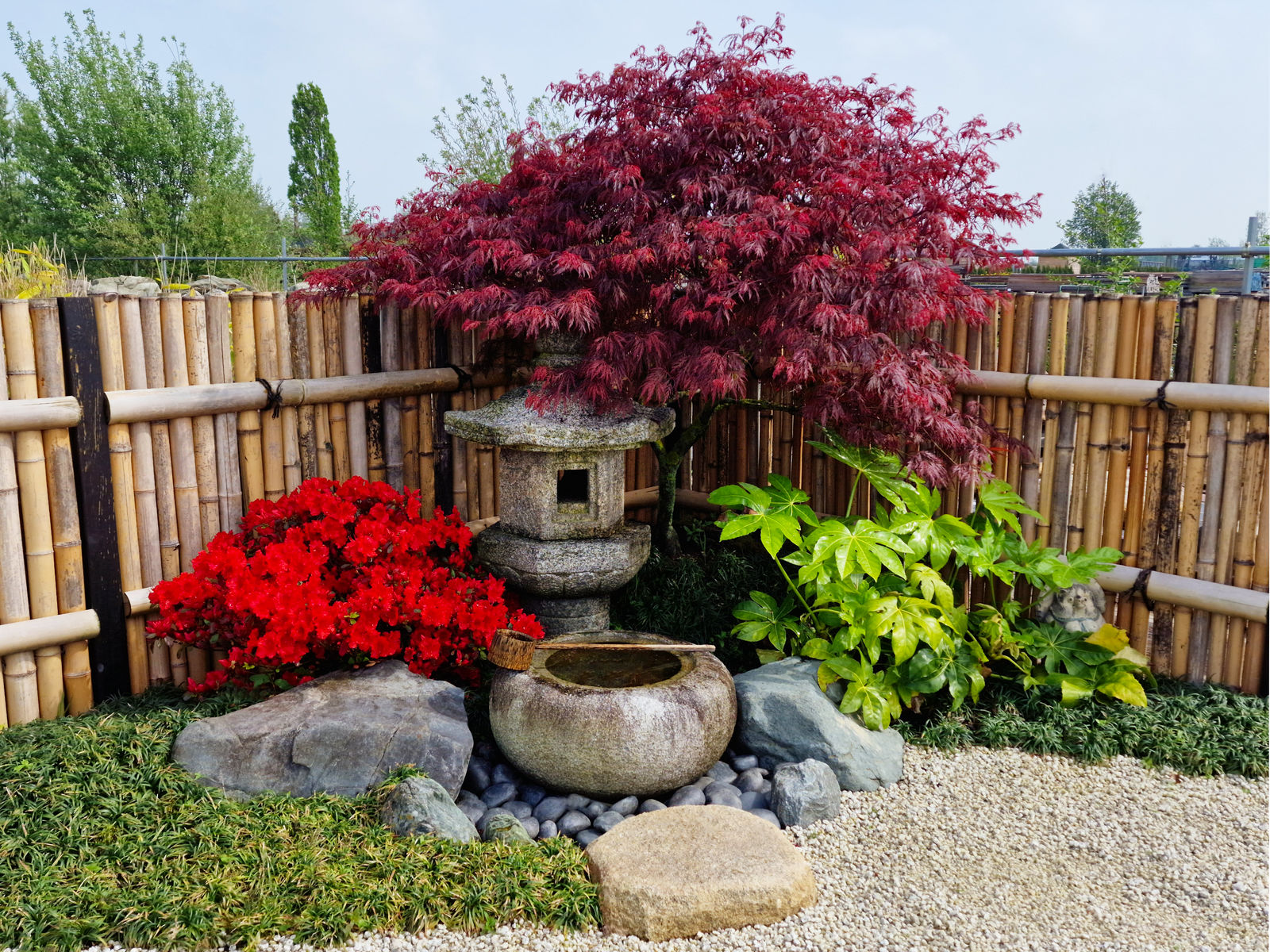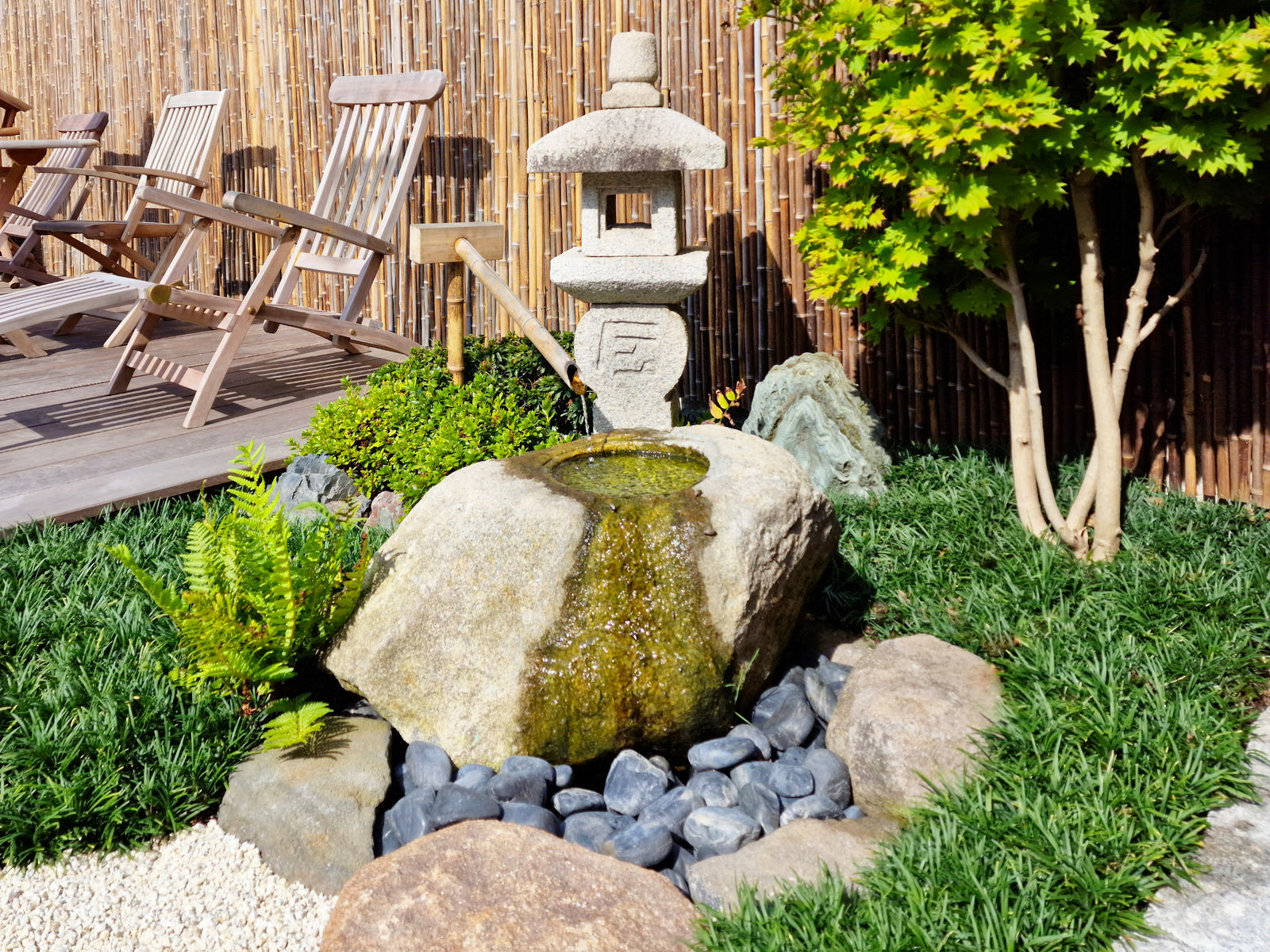Japanese Chōzubachi & Tsukubai - Information

Traditional Japanese Chōzubachi and Tsukubai: Origins, Design, and Sacred Simplicity in the Garden. At the heart of traditional Japanese garden design lies a profound respect for ritual, nature, and purity. Among the most symbolic and functional elements within this tradition are the chōzubachi (手水鉢) and tsukubai (蹲踞) - stone water basins used for ritual purification and contemplative pauses in the garden. These humble yet elegant features are deeply embedded in the philosophy of wabi-sabi and are indispensable in tea gardens (roji), temple landscapes, and refined private gardens.
Exquisitely handcrafted and rich in cultural heritage, these stone basins are more than ornamental - they are vessels of cleansing, both physical and spiritual. At Yokoso Japanese Gardens, we proudly offer an exclusive collection of authentic chōzubachi and tsukubai, sourced directly from Japan and selected for their timeless beauty and historical integrity.
Origins and Symbolism
The origin of the chōzubachi and tsukubai is intertwined with the development of Zen Buddhism and the Japanese tea ceremony. The term chōzubachi literally means 'hand-washing bowl' and was traditionally placed at the entrance to temples, shrines, and sacred gardens for ritual ablutions. The tsukubai, a specialized form of chōzubachi, emerged later as part of the chanoyu (tea ceremony) practice. Its name is derived from the verb tsukubau, meaning 'to crouch' or 'to bow low,' symbolizing humility. This act of stooping to cleanse one's hands and mouth before entering the tea room is both a physical and spiritual gesture, preparing the guest for the quiet and reverent atmosphere of the tea gathering.
From the Muromachi period (14th–16th century) onward, these elements became central to the aesthetic and ritual composition of Japanese gardens - especially in the roji, the 'dewy path' leading to the tea house.
Types of Chōzubachi and Tsukubai
While all chōzubachi and tsukubai share a common function, their form, size, and style can vary widely. The design selected often reflects the garden's purpose, the surrounding architecture, and the philosophy of its owner.
Maru-gata (Round Type) - These circular basins offer a soft, inviting silhouette and are among the most common styles. Their simplicity allows them to blend harmoniously into any natural setting.
Kaku-gata (Square Type) - A square or rectangular basin that offers a more formal and architectural feel. Often used in temple or courtyard gardens where symmetry and structure are emphasized.
Hōju-gata (Jewel Shape) - Shaped like a sacred jewel (hōju), this type carries strong symbolic associations with Buddhist purity and enlightenment. It is often found in temple gardens.
Natural Rock Tsukubai - Rather than a carved basin, a naturally hollowed-out stone is used, embodying the wabi-sabi ideal of imperfection and transience. These are favored in rustic or minimalist tea gardens.
Tsukubai Set - Each element is selected and arranged with great care, creating a meditative moment within the garden. A complete tsukubai arrangement includes:
The central basin (chōzubachi)
Yaku-ishi (supporting stones) – three or more carefully placed stones
Kakei (bamboo spout) – delivering water to the basin
Tobi-ishi (stepping stones) – guiding the path
Sōzu (bamboo deer scarer) – optional, adds sound and motion
Placement in the Japanese Garden According to the Sakuteiki
The placement of chōzubachi and tsukubai is guided by principles found in the Sakuteiki (作庭記), Japan's oldest text on garden design, written in the 11th century. The Sakuteiki stresses the importance of aligning garden features with natural forces, aesthetic balance, and spiritual resonance.
Key Principles for Placement:
Integration with the Landscape - Chōzubachi and tsukubai should appear as though they emerged naturally within the garden. They are often placed beside a path, under the eaves of a roof, or near a tree, creating a shaded, intimate atmosphere.
Emphasis on Humility - The tsukubai must be low to the ground to encourage the guest to bend or kneel - an act of reverence and self-effacement. Its height and placement express modesty, aligning with Zen and tea ceremony values.
Symbolic Orientation - The water basin is typically placed near the roji path, between the outer and inner tea garden, symbolizing the threshold between the mundane and the sacred. It often faces east or southeast, respecting traditional feng shui influences.
Framing and Stepping Stones - Tobi-ishi (stepping stones) are used to guide the guest to the basin in a controlled and mindful manner. The stones around the tsukubai should differ slightly in shape and height to encourage careful movement.
Harmony with Other Elements - The tsukubai is never placed in isolation - it must harmonize with nearby lanterns, trees, stones, and water features, ensuring a balanced and cohesive composition.
Materials Used in Traditional Chōzubachi and Tsukubai
Authentic basins are crafted from natural stone, chosen not just for durability but for how they weather and age within the garden environment.
Commonly Used Materials:
Granite – The most popular material, offering strength, longevity, and fine carving detail. It gracefully patinates over time, developing moss and lichen that enhance its natural character.
Basalt – A dark, volcanic stone that exudes quiet strength. Its subtle tones and textures work well in shaded gardens.
Andesite and Tuff – Softer volcanic stones used in more rustic or historic basins. These materials age quickly, creating a well-worn appearance ideal for antique settings.
Antique Stone – At Yokoso Japanese Gardens, many of our pieces are reclaimed from historic Japanese properties and temple sites, offering unmatched authenticity and character.
Each piece is hand-carved using traditional methods, ensuring that no two basins are identical. The irregularities and natural imperfections in the stone are embraced as part of the basin's beauty and narrative.
Exclusively Available at Yokoso Japanese Gardens
At Yokoso Japanese Gardens, we offer an unrivaled collection of authentic Japanese chōzubachi and tsukubai - available nowhere else in Europe. Our selection includes:
Antique stone basins with provenance
Hand-carved artisan pieces using traditional tools
Complete tsukubai sets including bamboo spouts, yaku-ishi, and tobi-ishi
Custom arrangements for tea gardens, Zen gardens, and contemporary spaces
We work closely with Japanese stonemasons, garden designers, and preservationists to ensure that each piece we offer honors the heritage of traditional garden design. Beyond offering beautiful objects, we provide expert consultation to help you place and integrate the basin into your own garden in a way that reflects the Sakuteiki principles and timeless Japanese aesthetics.
Conclusion
The chōzubachi and tsukubai are small in size but vast in meaning. They are tangible expressions of hospitality, humility, and harmony - principles that lie at the core of Japanese culture and garden design. From their spiritual origins in temple rituals to their poetic role in tea gardens, these stone basins remind us to pause, cleanse, and enter the present moment with reverence.
At Yokoso Japanese Gardens, we are proud to make these meaningful artifacts available to a new generation of garden creators and caretakers. Each piece is a bridge between cultures, times, and spaces - inviting you to experience the purity and serenity of a true Japanese garden.
#Chōzubachi #Tsukubai #JapaneseGarden #ZenGarden #TeaGarden #WabiSabi #StoneBasin #Sakuteiki #JapaneseWaterFeature #GardenElements #PurificationBasin #GardenInspiration #GardenArtistry #YokosoJapaneseGardens #AuthenticJapan #AntiqueStone














Contact Yokoso Japanese Gardens